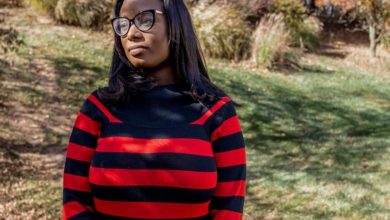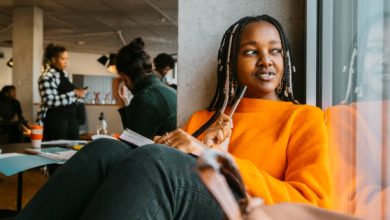I Was Diagnosed with Lupus at 21 — It Changed Everything


At 21, life was supposed to be unfolding just as Veronica planned — finishing college, earning a master’s in international business, traveling the world, and launching a global career. But instead of stepping confidently into her next chapter, she found herself sitting in hospital rooms, moving from one specialist to another, trying to make sense of symptoms that refused to fit neatly into a diagnosis.
After years of uncertainty and misdirection, she finally had a name for what was happening: lupus.
What she didn’t yet know was that the diagnosis — though life-changing — would become one of her greatest teachers.
“That experience taught me how to advocate for myself — not just in healthcare, but in every area of life. When you’re young and trying to make sense of a diagnosis like lupus, it’s easy to feel dismissed or unheard. I learned the importance of persistence, asking questions, and trusting my own instincts,” Veronica Vargas Lupo, Board Member for Lupus Research Alliance, tells BlackDoctor.
That early lesson in self-advocacy became the foundation for how she would navigate every challenge thereafter — with perspective, resilience, and determination.
“Lupus gave me a sense of perspective. I can look at a challenge, an obstacle, or just a bad day, and base my reaction accordingly. It allows me to keep moving forward with determination and hope,” she adds.
RELATED: How Patients Are Driving Breakthroughs in Lupus Research
Redefining Ambition
Being diagnosed during her senior year of college meant rewriting plans she’d once thought were set in stone.
“It was not easy,” she recalls. “I was very determined, and this was not a part of the plan I had for myself. I was diagnosed during my senior year of college and had all these goals: getting my master’s degree in international business, traveling, and building a global career. But life took me in a different direction at first.”
That direction didn’t mean giving up her ambitions — it meant reframing them.
“It took years — and a lot of support — to realize that maybe my path would just look a little different. I might reach my goals in five years instead of two, but I could still get there,” Veronica notes.
And she did. Moving alone to New York took courage — both for her and her family.
“Out of college, there were careers I didn’t pursue because I knew my limits,” she admits. “But I still found a way forward. IBM became that for me — a place that allowed me to travel when I needed to and have flexibility when I wasn’t able to. There is always a way forward. Sometimes, it just takes reimagining what that looks like.”
Family, Fear, and Finding Strength
Lupus was not new to her family. Her mother had been diagnosed years earlier, though with a milder, cutaneous form of the disease.
“At the time, it didn’t seem like a big deal. She had cutaneous lupus, mostly skin involvement, no organ issues, and it wasn’t life-threatening. My most distinct memories were her trying to find makeup to cover her butterfly rash. So, when I was diagnosed later and ended up in the ICU, it was terrifying for everyone. No one was prepared for lupus to suddenly become this big, serious thing,” she recalls.
Through that crisis, her family became her anchor.
“I look back at that time and really remember how much my dad stepped in. As a young person, he took on a lot of that mental load — I’ll always be thankful for that. But when I moved to New York, I had to start managing it on my own,” Veronica adds.
Now managing the disease on her own, Veronica refused to let fear define her relationship with lupus.
“I didn’t want to fear lupus,” she says.
Determined to be a part of the action, she joined the Lupus Research Alliance and its Young Leaders Board.
“There, we were doing something, building, and making an impact. That kind of support helps me the best— being active, positive, and forward-looking. I’m still grateful for it,” she explains.
Leadership and Lupus: Lessons in Patience and Progress
Over the years, she’s held leadership roles across industries, guiding major transformations in the corporate world. Surprisingly, those experiences often mirror her journey with lupus.
“Business moves a lot faster than lupus, which has been a big learning for me. I’ve had to rewire how I think about progress. In lupus, things don’t change overnight; it takes patience and perspective. Managing stakeholders, communicating clearly, staying focused on the end goal — those are skills I use in both worlds,” Veronica notes.
Veronica has also learned to be more intentional about how she manages her health day by day.
“I email my doctor when something feels off. I work out as much as I can within my limits, take my vitamins, eat well, and structure my days around my energy level. With that in mind, I try to schedule important meetings in the morning, because by the afternoon, my body feels different. I just know I don’t function the same way,” she shares.
Through it all, she’s learned to plan around her lupus instead of fighting it.
The Power of Vulnerability and Advocacy
Her advocacy reached a turning point when she first spoke publicly about her diagnosis at a Lupus Research Alliance Young Leaders event.
“I had always kept it private,” she admits. I worried people would judge me or see me as weak. Even in business school at Columbia University, no one knew.
That day, surrounded by peers and advocates, something shifted. Although she was terrified, the whole group had her back.
“It felt so liberating, as if a huge weight had been lifted,” she shares. “That moment reminded me that vulnerability is strength. It made me realize how much community and advocacy can empower us, not just as patients, but as people.”
Shaping the Future of Lupus Research
As an author of a study presented at the 2025 American College of Rheumatology (ACR) Convergence, she’s passionate about bringing patient perspectives to research.
“It’s critical. Without the voices of people living with lupus, trials will fail. The moment you bring patients into the process, you set research up for success,” she says.
Through the Lupus Accelerating Breakthroughs Consortium (Lupus ABC) — a collaboration between the Lupus Research Alliance, the FDA, and other partners — she’s helping to ensure patient experiences are front and center.
“In discussions through Lupus ABC, we’ve seen those ‘aha’ moments when researchers realize the impact of the disease on our lives,” Veronica adds.
That’s why the Lupus Research Alliance collaborated with the U.S. Food and Drug Administration (FDA) to form and administer Lupus ABC as the first public-private partnership that brings together people with lupus, federal agencies, medical societies, advocacy groups, industry, academic clinical researchers, and scientists, with the FDA, to bring the patient perspective to the forefront and to focus on the complex challenges of lupus drug development.
And for her, the global collaboration brings tremendous hope.
“So many aspects of lupus don’t get enough attention because they’re not being fully heard. If we miss humanity, we miss science. Listening to people living with lupus ensures researchers see the full picture,” she shares. “Lupus ABC gives me so much hope. Being in those rooms and seeing the lupus community come together globally is incredible. Lupus doesn’t have borders, and it affects minorities at higher rates, so having a truly global, inclusive perspective can unlock answers we’ve been missing.”
Redefining Balance and Moving Forward
Today, as a professional, a mother, and an advocate, she defines balance differently than she once did. She understands that she’s not going to be right all the time, which keeps her grounded.
“Balance is about prioritizing what matters in the moment, which might be, at times, your family, your work, or your health. I’ve learned that in finding balance, it’s okay to ask for help, to step back and reassess, hour by hour, even minute by minute if needed. That constant reprioritization — and knowing that I can adjust and still move forward — is key,” she adds.
Her message to young women facing new lupus diagnoses is that “lupus is not the end of what you thought your life would be.”
“It might look different; it might be harder or easier at times, but it’s still yours to build. Lupus is unpredictable, and so is life. But that unpredictability can also create opportunities you never would have otherwise,” she concludes. “My advice to young women is to set boundaries that keep you healthy, and don’t apologize for them. And keep pushing forward, even if it’s one small step at a time.”




